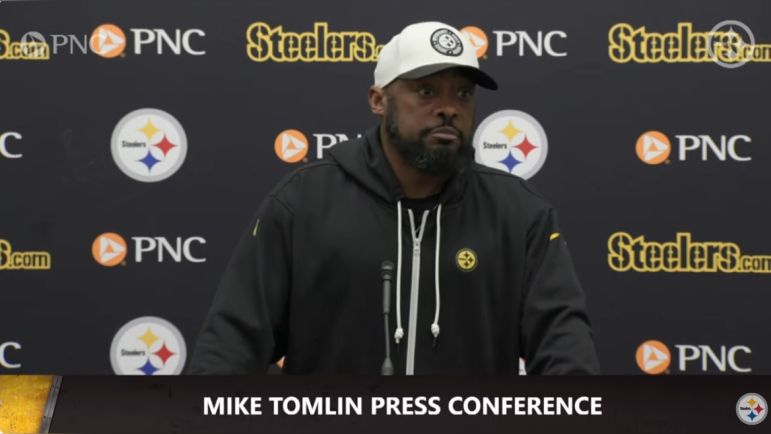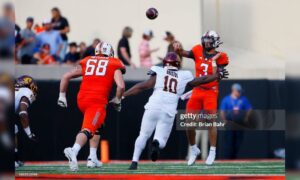Yet again against the New England Patriots last Thursday, the Pittsburgh Steelers came out slow to start the game, sleepwalking into what would be a barrage of points by the NFL’s worst-ranked offense coming into the contest. The Patriots drove 75 yards on their first possession of the game, getting into the end zone while managing to score 21 points by the halfway mark of the second quarter. Pittsburgh’s offense, meanwhile, looked lost yet again to start a game. The Steelers kicked a field goal on their first drive to respond to New England’s first touchdown, but then proceeded to punt three times in their next four possessions with the other possession ending in a QB Mitch Trubisky interception that set up New England’s second touchdown two plays later.
Head coach Mike Tomlin was asked Monday about his team’s trend of starting slow open games, having the offense need multiple drives to build some positive momentum while the defense gets embarrassed by an offensive unit that hadn’t been able to move the ball well all year.
“I’m not worried about 30 minutes of football,” Tomlin said to the media via video from the Steelers’ YouTube channel. “We play 60-minute football games. We don’t always start the way we desire, but usually that doesn’t define us. And so, I don’t paint with a broad brush relative to the start of games. We play 60-minute football games.”
Right, wrong, or otherwise, Tomlin has a point when saying that the Steelers’ continual slow starts haven’t defined them…to a point. They currently own a winning record at 7-6 and hold the sixth seed in the AFC playoff field as we sit here today. His team has shown the ability to overcome slow starts in several games this season, including in wins against the Cleveland Browns and Baltimore Ravens, who are both playoff-caliber teams.
Still, stating that he’s not worried about the first 30 minutes of football is negligent by Tomlin as those slow starts have affected his team and their ability to come back from deficits. We saw that Week One against the San Francisco 49ers. They got up early on Pittsburgh, forcing the Steelers to get one-dimensional, abandoning the run altogether and resorting to a passing game that has been shaky the last two seasons. We saw the same happen against the Houston Texans in Week Four and the Arizona Cardinals last Sunday as Pittsburgh got off to slow starts offensively, putting plenty of pressure on the defense to keep the score low. The defense eventually broke, ceding points and putting the Steelers in position where they had to try and come back from being down multiple scores.
Tomlin tried to refute the statement one of the media members made in saying that most teams don’t win games when down 18 points like Pittsburgh was on Thursday night against New England.
“Again, we don’t run away from challenges or adversity,” Tomlin said. “I acknowledge the probability of what you mentioned, but that game was very winnable for us.”
The fact of the matter is that the New England game was a very winnable game for Pittsburgh. The defense stopped the bleeding after a bad first half and the offense finally started to get the ball moving more to make it a three-point game with 11:44 left in the fourth quarter. Still, the offense again was unable to overcome that last obstacle and find the end zone or get into field goal range in the final moments, preventing a possible comeback.
A bad first half of football doesn’t mean that you can’t come back to win the game, but it should be a factor that a coach considers when his team is walking into a stadium. The Steelers have become the comeback kids these past two seasons, QB Kenny Pickett and the offense managing to pull off a drive in the final minutes of the game or the defense coming up with a clutch turnover to turn the tide and result in victory for Pittsburgh. However, relying on this recipe to win games consistently isn’t going to work against opposing teams that start fast, much like Pittsburgh has witnessed. The players have acknowledged the need to start faster on offense and not warm up to the game, knowing it directly impacts Pittsburgh’s chances of winning that contest.
It’s about time that Tomlin acknowledges this ongoing trend as well and address it. Otherwise, we will continue to see this team walk into games unfocused and rely on a second-half effort to come back after starting slow to open the game.







